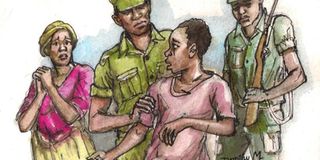Solving the puzzle when a person dies in police custody

What you need to know:
- A young man held in connection to the murder of a prominent businessman was found dead in the cell.
- His relatives and those of the deceased businessman, however, contested the young man’s death because he was believed to have contained information about the businessman’s killers.
A 23-year-old male adult was reported to have died in the early hours of a Saturday morning while in police custody. The deceased was believed to have had vital information about the killers of a prominent businessman.
The law makes it mandatory for a coroner to carry out an inquest into any death that occurs to any person while in police detention or custody.
An inquest is a legal procedure presided over by a coroner and is carried out in public interest to, among others, find out the medical cause of death and to draw attention to the existence of circumstances which if nothing is done about might lead to further deaths in custody.
It is also done to preserve the legal interests of the deceased person’s family or other interested parties. An inquest, unlike a criminal trial, is not carried out to establish criminal responsibility.
The deceased was identified by his mother who told court that she had been approached by the police who told her that her son was a suspect in the murder of a businessman. She told court that she then led the police to where her son was.
Unanswered questions
The young man was arrested and taken to a police post in the suburbs of the city. She was, however, informed shortly afterwards that her son had died. She rushed to the mortuary and was able to positively identify his body. Photographs of the deceased taken at the time of the discovery of his body were also tendered in court. Court was thus satisfied of the identity of the deceased.
The police officer in charge of the police post where the young man was detained confirmed to court the fact and place of death of the young man. Two other suspects detained with the young man at that time corroborated the police officers story. The coroner was therefore, satisfied that the young man indeed died at the police post while in police custody.
From the evidence of the inmates who where in detention with the young man and also the statements of the police officers based at the police post, the young man apparently died as a result of hanging attributed to suicide. This was also the view of the doctor who performed the postmortem on the deceased on the day he was found dead. The coroner had the opportunity to see photographs of the deceased taken immediately after his death and these showed the naked body of a male adult hanging on a door by the sleeve of a jacket.
The conclusion that the young man committed suicide was contested by his relatives and those of the slain businessman. The relatives were suspicious of the circumstances surrounding the arrest and detention of the deceased especially that he was detained in a relatively remote police post different from the police station where the case was initially reported and was being investigated.
Foul play at play
No reason was given for this discrepancy and the relatives therefore suspected foul play especially as the case for which the young man was arrested for was murder, which must of necessity be investigated in the main police station.
The results of the first postmortem examination that was carried were therefore, contested and the coroner, as a result, ordered the exhumation of the body of the young man for purposes of conducting a second postmortem. Another doctor was asked by the coroner to carry out the second postmortem. The doctor exhumed the body and carried out the postmortem and filed a report in court. Court, therefore, had two postmortem reports and had to call the two doctors to testify during the inquest and defend each of their reports.
The coroner conducted public hearings and also visited the police post in order to get to the bottom of what could have caused the death of the young man.
To be continued




